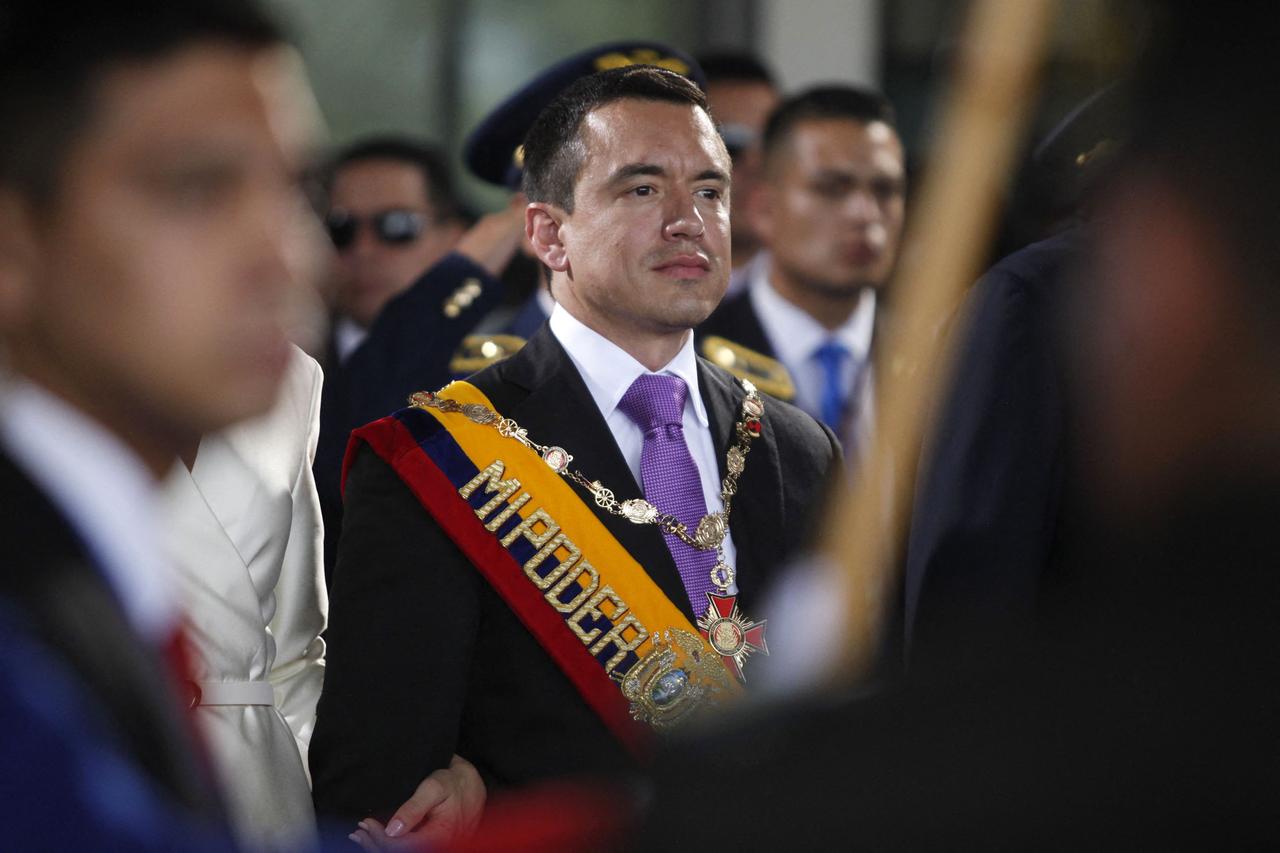
Daniel Noboa, 37, was sworn in for a full four-year presidential term on April 13 at Ecuador's National Assembly in Quito, formally beginning his 2025-2029 administration after winning a decisive second-round election victory with 55.8% of the vote against challenger Luisa González's 44%.
The youngest elected president in Ecuador's history received the presidential sash during a ceremony attended by regional leaders, including Colombian President Gustavo Petro, Peruvian President Dina Boluarte, and U.S. Health Secretary Robert F. Kennedy Jr., representing President Donald Trump.
Foreign ministers from Brazil, Bolivia, and Costa Rica also attended alongside diplomatic representatives from numerous countries.
In his inaugural address, Noboa called on all political parties to set aside differences and work together to build Ecuador's future. He emphasized his administration's unwavering commitment to combating drug trafficking and violence that have plagued the South American nation throughout his abbreviated first term.
"This is a direct fight against organized crime structures. There will be no ceasefire in the fight against crime. We don't have time to lose; we have a lot of work to do. We will never tolerate corruption," Noboa declared during the ceremony.
The president thanked all who supported his government, stating, "The new Ecuador will not stop. The country chose change with the belief of leaving the past behind and a better future for everyone. We will not hesitate to fight criminals who for years have thought they owned this country."
Following the ceremony, Noboa greeted supporters gathered at Independence Square.
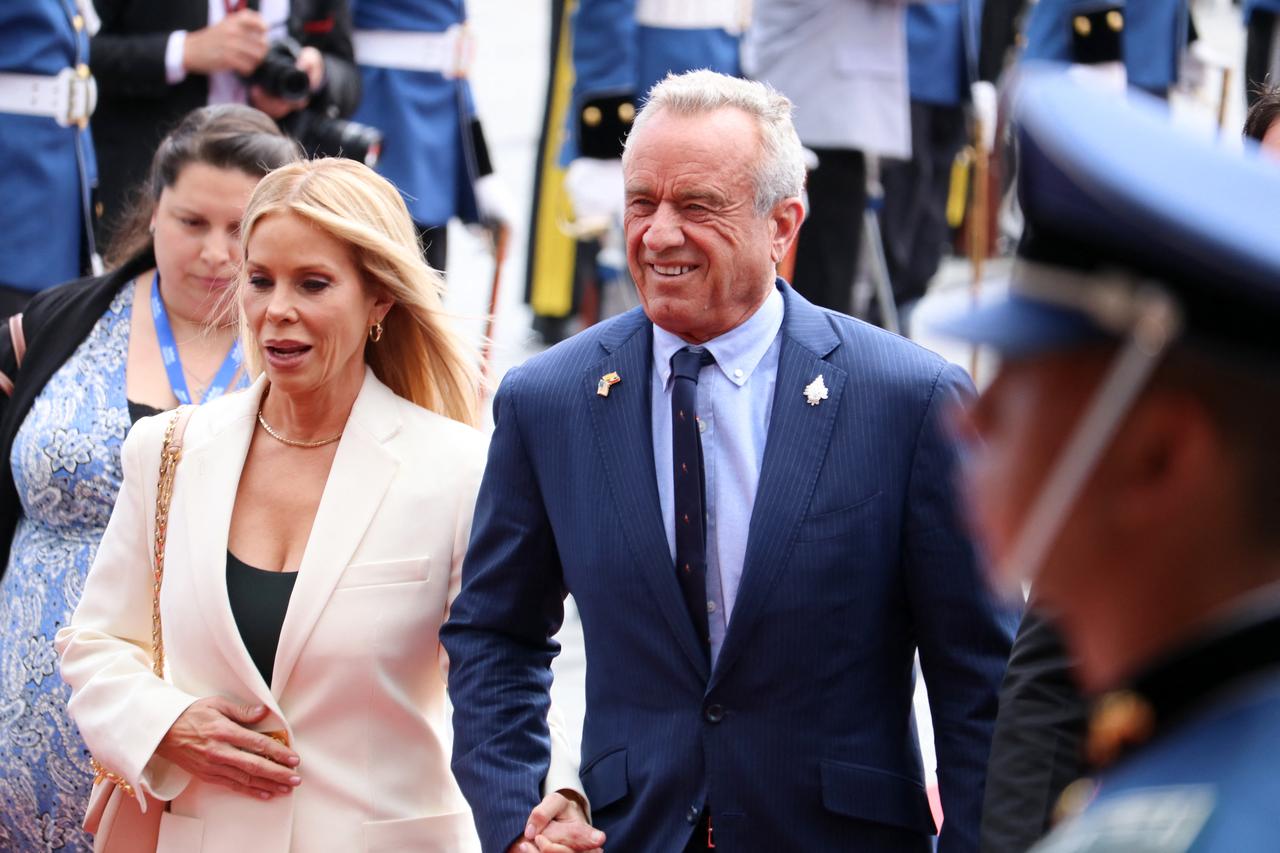
Noboa's first abbreviated term from November 2023 to May 2025 was defined by Ecuador's escalating security crisis driven by drug-related violence. The president declared an "internal armed conflict" in January 2024, deploying military forces to the streets and prisons through his comprehensive "Phoenix Plan" to combat drug gangs that had transformed Ecuador into a major cocaine transit hub.
The Phoenix Plan included building maximum-security prisons, increasing port security, and designating 22 criminal organizations as terrorist groups.
Noboa's administration reported a 15% reduction in violent deaths and improved prison security, with major gang leaders captured during military operations. The president also proposed housing dangerous convicts on prison ships and boosting military presence at borders and ports.
In February 2024, Noboa signed a security agreement with Erik Prince, founder of the private military company Blackwater, for anti-crime operations and ratified two U.S. military cooperation agreements.
However, his security approach drew international criticism in April 2024 when he ordered a controversial raid on the Mexican Embassy in Quito to arrest former Vice President Jorge Glas, who had been convicted of corruption, sparking condemnation for violating diplomatic norms.
Despite these efforts, violence surged dramatically in early 2025, with January recording 781 homicides, making it Ecuador's bloodiest month.
Ecuador's homicide rate dropped from 46.18 to 38.76 per 100,000 people between 2023 and 2024 but remained far above 2019 levels, illustrating the persistent challenge facing the administration.
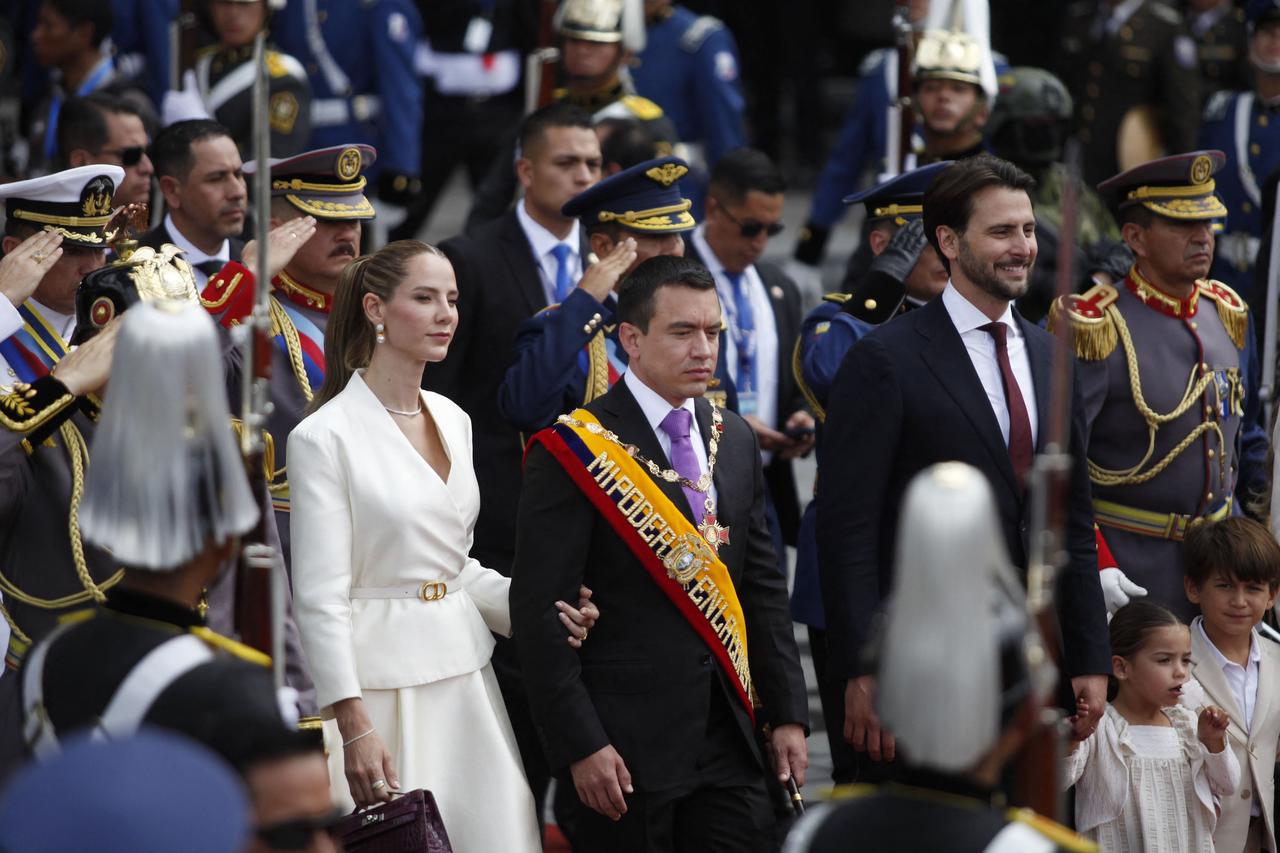
Beyond security, Noboa's abbreviated presidency grappled with significant economic and infrastructure challenges.
The administration paid $2.6 billion to the Ecuadorian Social Security Institute and cleared other government debts while claiming record deposits in private banks and high Black Friday sales, though economic growth remained sluggish at 1.4% according to International Monetary Fund estimates.
Noboa sought foreign investment through visits to the United States and Europe, meeting with World Bank and International Monetary Fund officials.
His administration implemented 27% tariffs on Mexican imports and repealed amnesty for undocumented Venezuelan migrants as part of broader economic policy adjustments.
The country faced a severe energy crisis with rolling blackouts lasting up to 14 hours daily due to drought affecting hydroelectric dams. Noboa's government worked to restart a stalled hydroelectric dam project and increase power generation capacity while pleading with Colombia to renew electricity imports.
The energy shortages highlighted Ecuador's infrastructure vulnerabilities and economic dependence on hydroelectric power.
The president also incorporated 6,400 community teachers into the education system and used social media effectively to appeal to young voters with a modern campaign style, though his administration faced criticism for alleged misuse of public funds and accusations of not relinquishing office during the campaign period as required by electoral laws.
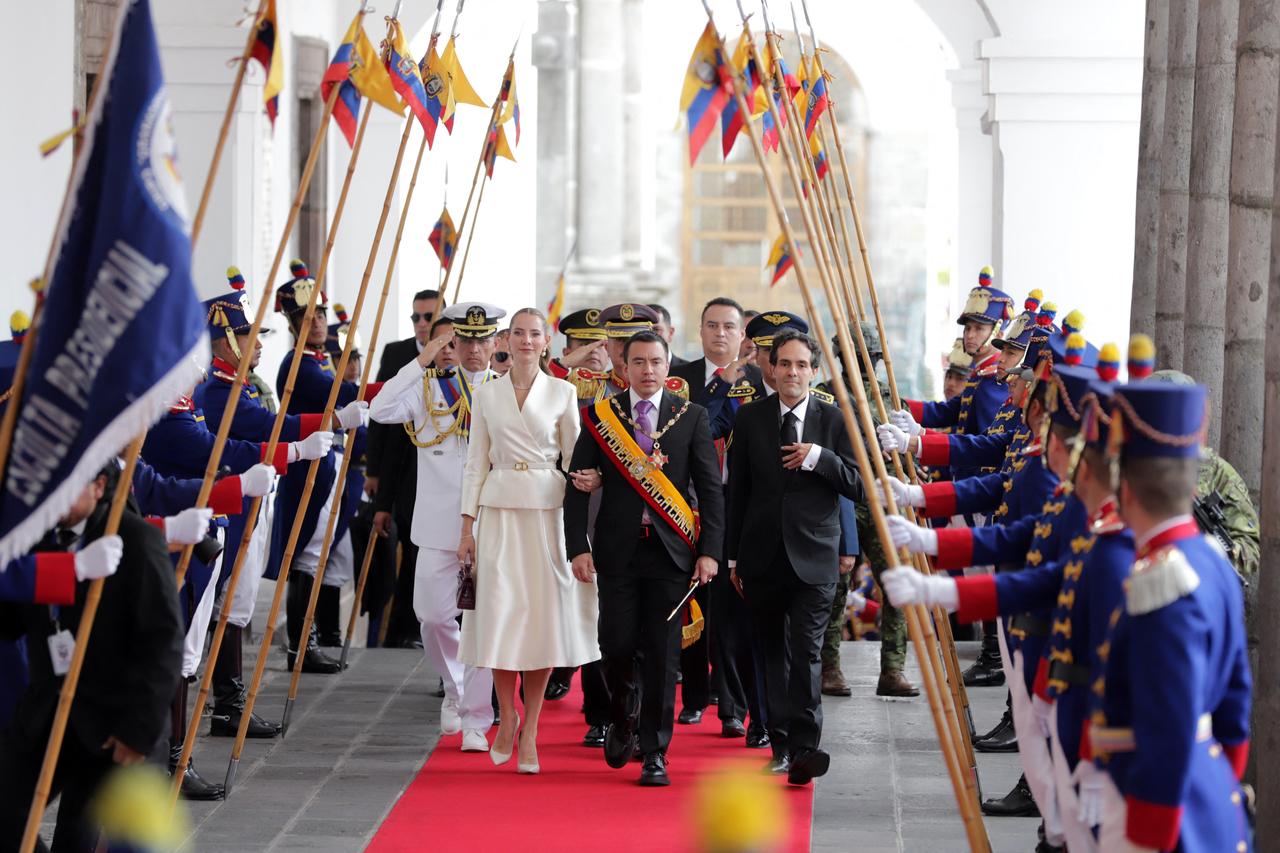
Noboa's presidency has been marked by political tensions and controversial decisions that have raised concerns about democratic norms. His public falling-out with Vice President Verónica Abad, who was subsequently suspended, created constitutional concerns about the stability of his administration.
Critics have accused Noboa of authoritarian tendencies, pointing to the embassy raid, increased militarization of civilian life, and what they describe as human rights concerns stemming from his security approach.
The president has also faced accusations of sidestepping democratic norms and exploiting public resources during his 2025 reelection campaign.
Despite these controversies, Noboa's tough-on-crime stance and business background have resonated with voters, particularly young Ecuadorians who supported his modern campaign approach and promises of economic opportunity.
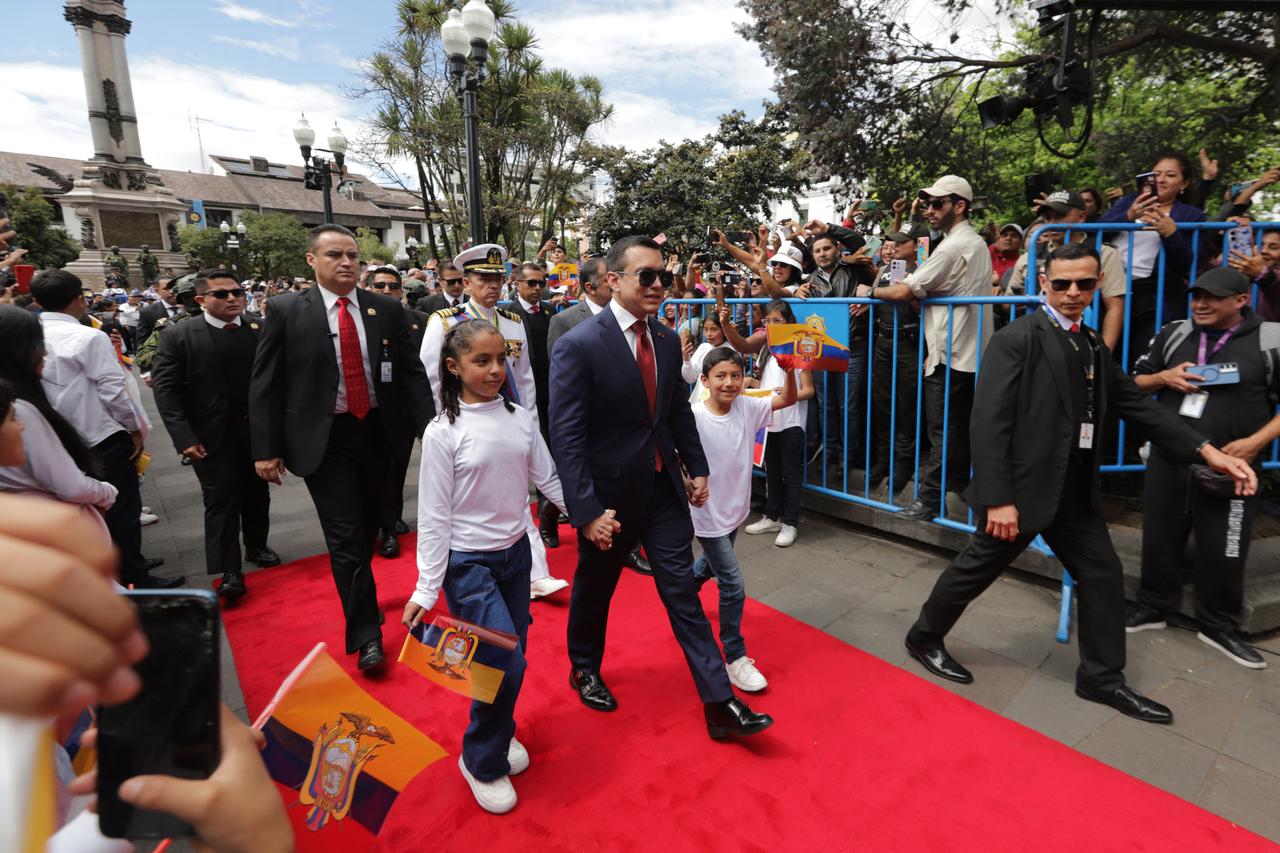
For his full four-year term beginning in 2025, Noboa has outlined ambitious campaign promises focusing on continuity of his security policies while addressing voter concerns about employment and infrastructure.
His security agenda includes continuing the Phoenix Plan with military deployment and maximum-security prisons, seeking foreign military support from the United States, Europe, and Brazil to combat gangs, and proposing constitutional changes to allow foreign military bases, which have been banned since 2008.
On economic policy, Noboa has promised to boost growth through private sector collaboration and foreign investment, create jobs, especially for young people through tax exemptions and business incentives, and invest in infrastructure to support economic development.
His social agenda includes tackling corruption with stricter measures and judicial reforms, improving education access, including free university entry, and addressing the root causes of violence through job creation and social investment.
However, Noboa faces significant political obstacles in his second term. The National Assembly is divided, with his party holding 66 seats against the opposition Citizen Revolution Movement's 67 seats, necessitating coalition-building to advance his legislative agenda.
His alignment with figures like Donald Trump and El Salvador's Nayib Bukele signals a right-wing shift in regional politics, but delivering on campaign promises amid Ecuador's complex security and economic crisis will test his governance capabilities.
Noboa, born Nov. 30, 1987, in Miami, Florida, and raised in Guayaquil, is the son of billionaire businessman Álvaro Noboa and physician Annabella Azín. He is heir to the Noboa Corporation, a major banana export business, and holds a business administration degree from NYU Stern and an MBA from Northwestern's Kellogg School.
Before entering politics, he held roles in his family's company and was elected to the National Assembly in 2021, representing Santa Elena province, where he chaired the Economic Development Commission until the Assembly's dissolution in 2023.